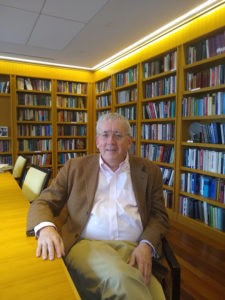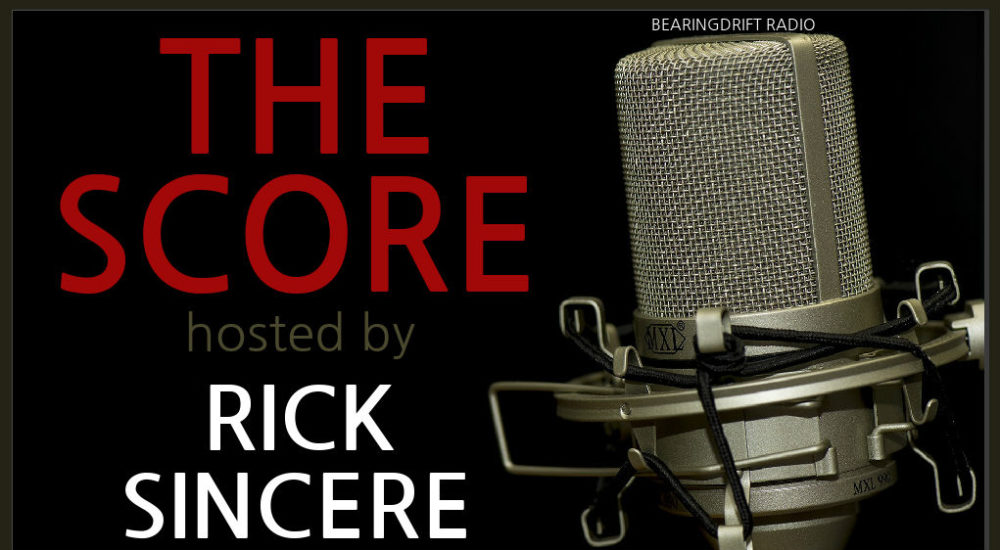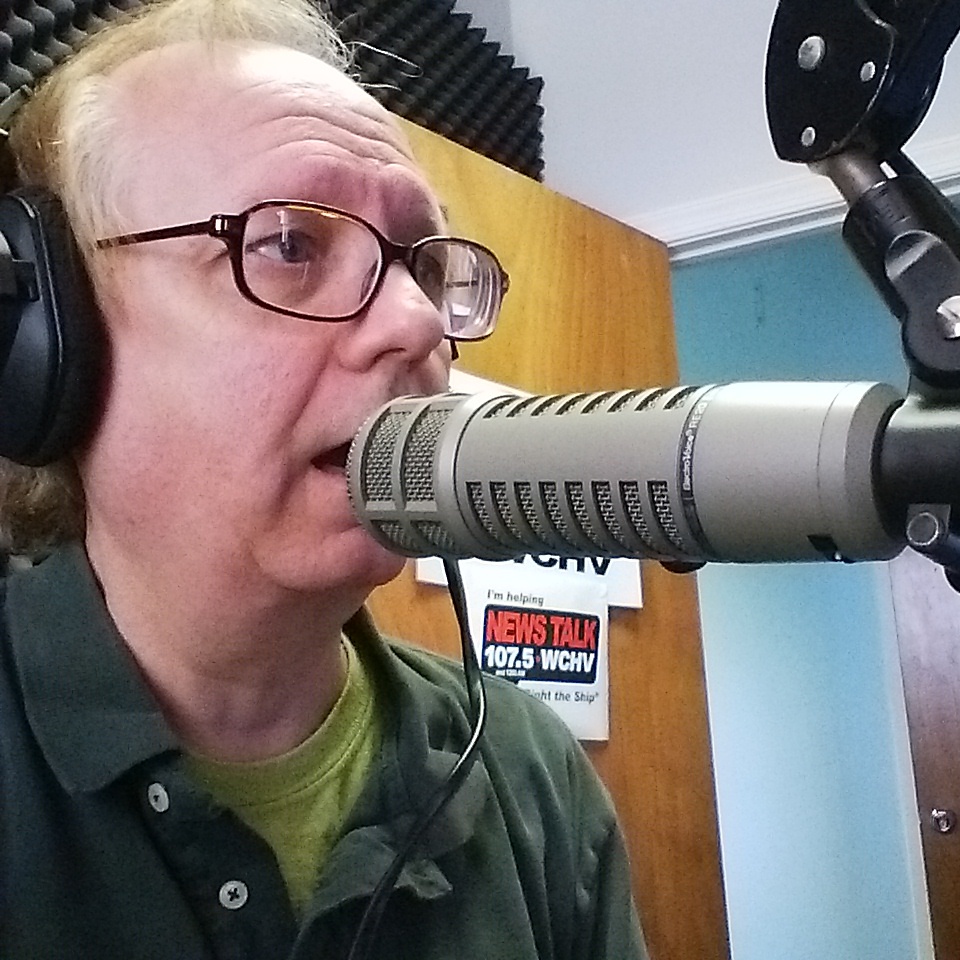The Score: Buying Gay, Facebook Break-Up, Final Exercises, Import Taxes
This week on The Score – Was the gay rights movement propelled by capitalism? Why do people want to break up Facebook? Has the University of Virginia changed the way students graduate? How will Trump administration tariffs and trade policy affect the U.S. economy?
Gay Capitalists
Last week on the show, we talked to University of South Florida history professor David K. Johnson about his 2004 book, The Lavender Scare: The Cold War Persecution of Gays and Lesbians in the Federal Government, which has been turned into a documentary film that opens in theaters on June 7 (with a special screening and panel discussion at the Avalon Theatre in Washington, D.C., on Wednesday, June 5) and debuts on PBS television stations on June 18. The official trailer was released earlier this month.
This week we continue our conversation and learn about Dr. Johnson’s most recent book, called Buying Gay: How Physique Entrepreneurs Sparked a Movement, which explores the underreported story of how twentieth century entrepreneurs took advantage of the free enterprise system, leading to political achievements in the twenty-first century.
Breaking Up Facebook
 Many people are angry at Facebook and other social media sites. Some are urging the government to pursue anti-trust actions. Even Facebook co-founder Chris Hughes, who was Mark Zuckerberg’s Harvard roommate, has called for the break-up of the company he started. (I have suggested that, if Hughes wants to reduce Facebook’s dominance in the social media sphere, he should take over its leadership and run it the way he ran The New Republic.)
Many people are angry at Facebook and other social media sites. Some are urging the government to pursue anti-trust actions. Even Facebook co-founder Chris Hughes, who was Mark Zuckerberg’s Harvard roommate, has called for the break-up of the company he started. (I have suggested that, if Hughes wants to reduce Facebook’s dominance in the social media sphere, he should take over its leadership and run it the way he ran The New Republic.)
I asked Cato Institute vice president John Samples about the possibility of the government breaking up Facebook. We spoke last Monday in Washington.
He began by explaining the recent evolution of antitrust policy:
Antitrust policy exists to assure competition. It’s based on the idea that sometimes you get monopolies that you can’t compete your way out of — they are natural monopolies or something like that. Now, over the last 40 to 50 years and because of conservatives — this is one of the great achievements of conservative public policy theorists — we have had a standard for using antitrust that focused on consumer welfare. We didn’t ask how big [corporations] are or how concentrated they are (the old questions of antitrust liberals) [but] rather, what is the effect on the consumer here? If the prices don’t go up, these consumers are getting more for less.
What is the point of going through all this vast process to break up or to regulate an industry? So that was the question that’s been the standard. Now, with these [social media] companies, I think, you have to say that it’s very hard to argue that consumers are being harmed.
John Samples previously appeared on The Score to discuss proposed reforms for the Electoral College. He can be found on Twitter as @SamplesAtCato.
Final Exercises
It’s graduation time around the country. High school and college students and their families are celebrating the successful completion of their studies and looking forward to life in the real world.
At the University of Virginia, graduation ceremonies are called “final exercises” and nowadays feature celebrity speakers like musician Pharrell Williams. It has not always been like this. I spoke on Thursday afternoon with Coy Barefoot, executive director of the Charlottesville Museum for History and Culture, who looks back at the earliest UVA traditions:
In the 19th century what we now recognize as final exercises or graduation ceremonies was called “public day.” It was the day when the University would open itself to the public and they would choose some of the best students to present their work. You can think of it as sort of a very public, scholarly lecture that this student, say from mathematics, would deliver a prize paper or somebody in political science would speak about an essay that he wrote about government. The public, who are obviously mostly family members, would come to Charlottesville and sit in for this, these public day ceremonies that were of course recognizing the fact that these students had finished their coursework had satisfied the requirements for degrees.
As an aside, this past Friday evening (May 15), the Charlottesville Museum for History and Culture and the Albemarle Charlottesville Historical Foundation sponsored a talk by Pulitzer Prize-winning historian Alan Taylor about the origins of the University of Virginia. I invited Taylor to be a guest on The Score and we should follow up on that before the end of June.
Taxing American Consumers
Last week, the Trump administration announced that tariffs on Chinese goods purchased by American consumers and businesses will rise to 25 percent. Raising taxes is not something most presidents like to brag about, but Donald Trump does. The tariffs — import taxes — will hit Americans in their pocketbooks and bank accounts. As Washington Post reporter Abha Bhattarai noted:
Shoppers can expect to soon see higher prices on such everyday items as shampoo, suitcases and salmon, as the latest round of tariffs trickle down to consumers. American businesses have so far shouldered much of the burden of rising costs, but owners say that they now have little choice but to pass on the 25 percent tariff to shoppers….
In all, American families will pay an extra $767 a year on everyday items following Friday’s tariffs, according to a report by the Trade Partnership. If Trump makes good on his threat to tax all remaining Chinese imports, that figure could go up to about $2,389 a year for the average household. It could also lead to 2.2 million job losses and a 1 percent dip in GDP, the report said.
 Daniel Ikenson is director of the Cato Institute’s Herbert A. Stiefel Center for Trade Policy Studies, where he coordinates and conducts research on all manner of international trade and investment policy. He has worked at Cato since 2000. I met with him on Monday afternoon and asked him how these tariffs will damage the U.S. economy.
Daniel Ikenson is director of the Cato Institute’s Herbert A. Stiefel Center for Trade Policy Studies, where he coordinates and conducts research on all manner of international trade and investment policy. He has worked at Cato since 2000. I met with him on Monday afternoon and asked him how these tariffs will damage the U.S. economy.
They’re certainly adding costs for businesses that rely on imported intermediate goods, raw materials, capital equipment. And what that does is drive up the cost of production and reduces profits.
When manufacturers have reduced profits they invest less, they hire less, and it could trigger a recession. Meanwhile consumers, when they go to the retail stores, are seeing higher prices, which means that their costs of living are higher. They’re getting less bang for their buck… Meanwhile, there’s retaliation against manufacturers and farmers, and what they’re seeing is the revenues go down. So that’s the other side: revenues are going down, costs are going up, squeezing profits even more so.
It’s a high stakes game for Trump. I mean, he sees some problems in China that he wants fixed, and I share his concerns about these problems, some of them. And, interestingly, I think there’s broad bipartisan support for the tougher tack, the United States is taking toward China. I think had Hillary Clinton been elected she would have had an aggressive policy but she probably would have brought a case to the World Trade Organization, sponsored by the US and the EU, and Japan and Korea, so that we would have more leverage to compel China to come into compliance and to do better but the bottom line is, the President is willing to risk the economy, risk higher costs for businesses, less spending power for families, in order to get China to make some some serious reforms.
You can follow Dan Ikenson on Twitter at @dikenson.
Come back next week for more news, reviews, and interviews on The Score. Reader and listener comments are always welcome.



